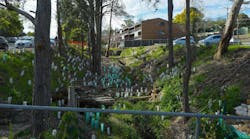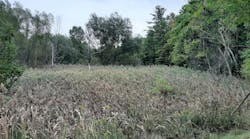CPESC and CPSWQ showcase Their Benefits and Professional Incentives in North Carolina
One of the North Carolina Department of Transportation’s (NCDOT’s) strategic goals is to strive to provide workplace development opportunities for its employees. The department has incorporated the Certified Professional in Erosion and Sediment Control (CPESC) and the Certified Professional in Storm Water Quality (CPSWQ) programs as components for its staff development initiative.
Over the past three decades, NCDOT has operated under a delegated erosion and sediment control program for its highway and bridge construction land-disturbing activities. Regulatory agencies permit the department to design erosion and sediment control plans for its projects and provide onsite overview and implementation during the construction process. Because NCDOT is a National Pollutant Discharge Elimination System (NPDES) Phase I entity, its NPDES permit provides directives for stormwater management for construction activities as well as borrow-pit and waste-pile activities.
The Certified Professional programs provide an excellent opportunity for employees to demonstrate their expertise in the erosion and sediment control and stormwater disciplines. NCDOT launched a career-development and training program for its transportation technicians, known as the Transportation Technician Skill Based Pay Program. Transportation technicians obtain training in specialty areas and demonstrate these skills in performing their core job responsibilities over a designated time period. Advanced transportation technicians who perform erosion control and stormwater site evaluations can obtain registration for CPESC, incorporate the skill sets obtained into their key responsibilities, and become eligible for a compensatory skill block that is added to their annual salaries. The program is designed to train and develop employees to reach the market reference rate, or the amount competitors compensate employees with similar skill sets.
Registrants as CPESCs or CPSWQs can also benefit under another department workforce development pilot initiative for its roadside environmental engineers. The Competency Based Pay program targets engineers, engineering supervisors, and engineering managers for training and development. In addition to obtaining key competencies in each of the above roles, engineers are evaluated for the scarce skills that they possess and utilize in their profession. Scarce skills are those skills and proficiencies that are unique for one’s professional specialty area and add significant value to the core mission of the organization. CPESC and CPSWQ registration are included in the scarce skills inventory for NCDOT’s roadside environmental engineers who design erosion and sediment control plans and those who provide engineering oversight on erosion and sediment control/stormwater implementation during project construction. Certified Professionals are eligible for salary supplements under this portion of the department’s career development program.
Presently, NCDOT has approximately 25 CPESC registrants, and many are pursuing CPSWQ registration in 2005. The department provides resource materials for employees to prepare themselves to sit for examination. Additionally, review classes are held each year to provide training and instruction opportunities. North Carolina’s Land Quality regulatory section for erosion and sediment control has also endorsed the CPESC and CPSWQ program. Several North Carolina municipalities that enforce local erosion and sediment control/stormwater ordinances require their employees to obtain CPESC or CPSWQ registration as a condition of employment.
One of NCDOT’s 2004 environmental goals was to provide timely program delivery of transportation projects with environmental excellence. The department was able to contract out over $1 billion of land-disturbing highway construction activities without any erosion and sediment control or stormwater violations from regulatory agencies. Dedicated employees, many of whom are Certified Professionals, working together to build trusting relationships with the regulatory community helped make the goal a reality.
Perhaps your organization or business can adopt similar professional career development programs that incorporate CPESC and CPSWQ registrants. Contact the author at [email protected] for additional information on NCDOT’s initiatives.


